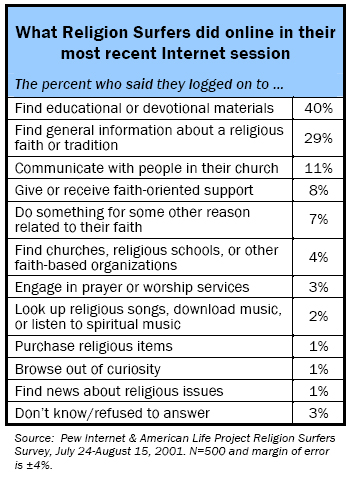Getting started
In addition to asking respondents about their general use of the Internet to get religious and spiritual information, we also asked a series of questions about the most recent time they went online for such information. We have used this technique in other research to try to understand more fully the kinds of information people seek, the strategies they use to find the information that matters to them, and their satisfaction with Internet tools in getting them the material they want.
In our sample of 500 Religion Surfers, 9% of them had looked for religious or spiritual information via the Internet on the same day we reached them, 26% had gone online for such information within the past week, 29% had made the search within the past month, 26% had made the search in the past six months and 9% had performed the search more than six months ago.
Not surprisingly, the people who had searched quite recently for information (those who searched within the past week) very closely match the profile of our Active Seekers in their enthusiasm for their faith, their involvement with their places of worship, and their personal prayer practices.

Why they went online
The substantial majority of these Religion Surfers were trying to get information, rather than using the communication features of the Internet to interact with fellow church members or others who are interested in spiritual issues. A strong plurality of the respondents were doing searches related to their personal spiritual growth.
Three-quarters of these Religion Surfers (76%) went to three or fewer sites in their most recent online quest.
Religion Surfers’ favorite sites
One significant finding is that the Religion Surfers who say they have a favorite spiritually-oriented Web site were different kinds of searchers than were those who didn’t have a favorite site. In general, 42% of Religion Surfers said they have a favorite place on the Web, while 55% said they tend to go to different sites in their spiritually-related searches.
In their most recent search, 39% of our respondents said they went to a familiar place online, while the rest either went to search engines like Google or Yahoo (36% did this), or a more general site such as the AOL home page or MSN.com (15% did that), or a religious portal (4% did that). Those who had a favorite site were more likely to have gone online in the last week than those who have not found a favorite cyberspot (40% to 33%). And those who have bookmarked or remembered a favorite Web site were more focused in their time online: 60% went straight to their favorite site, while 49% of those without a favorite site begin their searches at a major search engine.

There was no dominant pattern to the favorite sites Religion Surfers identified. The 208 respondents who said they had a favorite site identified more than 100 different sites as their favorites – some of the sites were focused on one denomination or institution, some were ecumenical, some were devout, some seemed more skeptical, some were commercial, some were tied to religiously oriented organizations, some were oriented towards religious approaches to social and political issues, some focused exclusively on ecclesiastical matters, and some included religious material amidst a wide array of secular content.
Overall, 55% of the respondents said their favorite site was affiliated with a particular religious or spiritual group that they belong to and 42% said their favorite site did not have that kind of personal affiliation. And every one of those who said the site was connected to a group they belonged to also report that they belonged to the group before they found the site. In other words, at least for those we call Religion Surfers, use of the Internet does not lead them to join a new faith-based organization or group as much as help them connect better with organizations to which they already belong. This is different from our findings related to many secular kinds of communities. We have found that use of the Internet has led people to join groups that they didn’t belong to before they started using the Internet.
How they found their favorite sites
Word-of-mouth and offline marketing are the major ways that people have found a favorite spiritually oriented Web site. Fully half of those who have such a site (46%) say they found out about it from a family member or friend or in a church publication or bulletin. Another 31% say they saw an advertisement for the site or found it through TV, radio, or a magazine. Just 18% say they found their favorite site during an online search or chanced upon it while browsing the Web.
Did Religion Surfers find it easy or hard to get what they wanted online?
More than half of these Religion Surfers (56%) said it was very easy to find the information they wanted and another 32% said their search was somewhat easy to perform. Only 10% expressed some frustration with the difficultly of doing what they wanted to accomplish online.
We have asked similar questions of several other kinds of Internet users and have found roughly similar results. Those who belong to communities online (communities of all types, not just those that have a religious component), those who get health information online, those who used the Internet to get information about the terror attacks on America on September 11, and those who use government agency Web sites report similar levels of satisfaction or facility in their recent attempts to use the Internet for those purposes. For instance, 80% of those who use government Web sites say they accomplished what they wanted in their most recent effort to use such sites.


